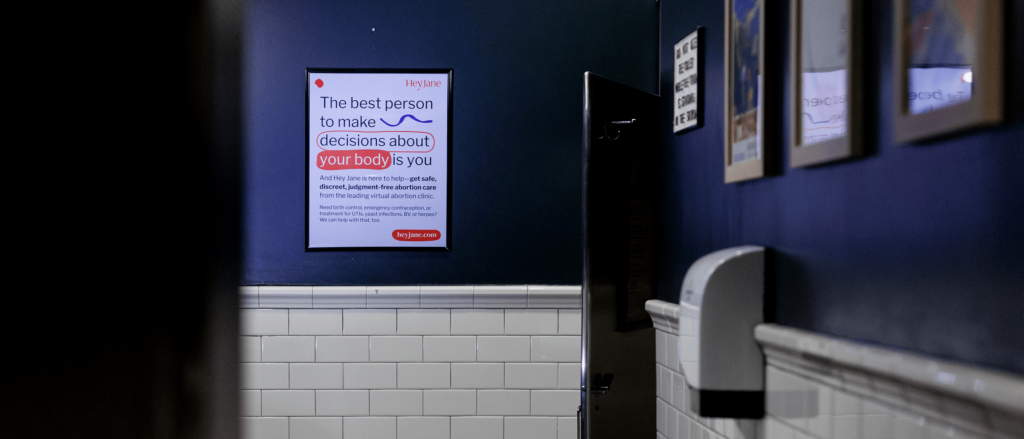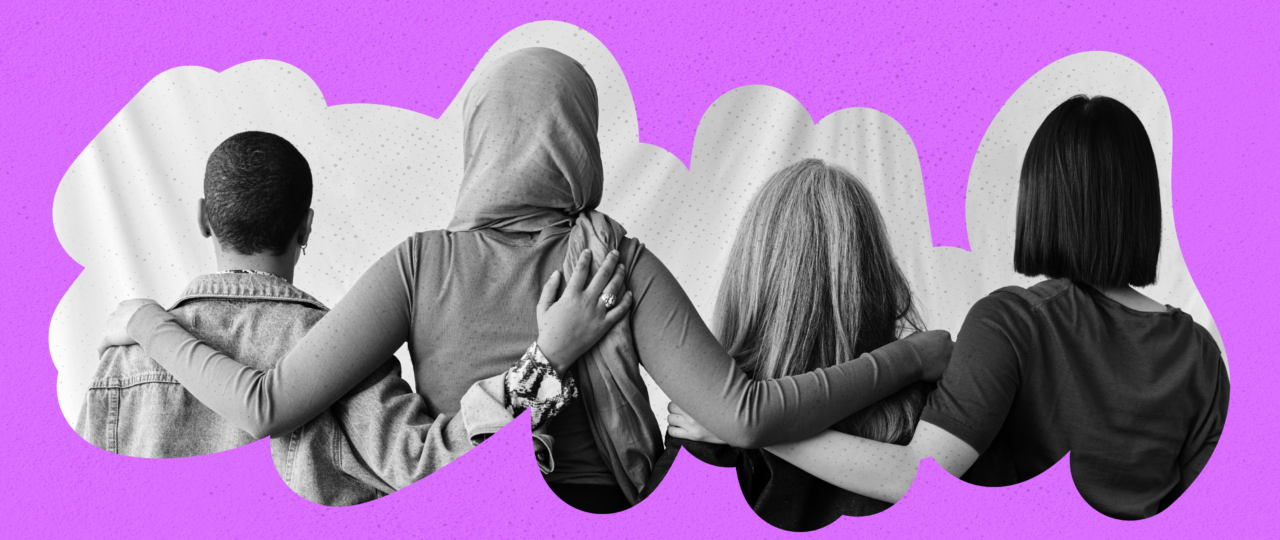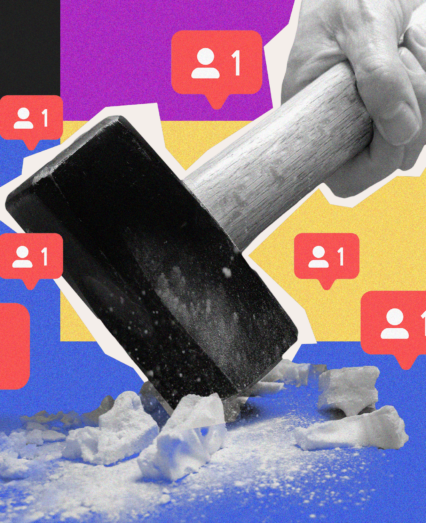Talk to any woman, and she can probably name at least three different ways she’s been offended by women’s representation in media. At least. Whether we’re talking movies, television, or (you guessed it) advertisements, there have always been ten Don Drapers in a room, mystified by the idea of “what women want,” while one Peggy Olsen shakes her head in the corner.
Now, we’ve come a long way since the days when the word “period” couldn’t be used in commercials for period products (did you know Courteney Cox was literally the first person to ever say “period” on television? Tampax, breaking boundaries!)—but we’d be kidding ourselves if we said we still didn’t have a long way to go.
For International Women’s Day, we decided to ask the women at ChatterBlast what marketing campaigns geared toward women made an impression on them, positively or otherwise. We expected a lot of “Real Beauty by Dove” answers (no shade), or a lot of examples of the not-so good. Suffice to say, we were blown away by the breadth of all the responses we received.
So here’s the good, the bad, and the ugly when it comes to marketing campaigns geared toward women (but mostly the good).
Shivani loves: #ShareTheLoad by Ariel
Growing up (and even now), my parents ordered a subscription to about seven or eight Indian TV channels. Whenever I go home to visit, Indian TV is always on and we all end up watching together. A few years ago, there was a series of commercials called #ShareTheLoad by Ariel, a laundry detergent company. The purpose behind this series was to identify and encourage change in the work that goes into making a home. The work shouldn’t fall just on woman; instead, it’s both partners that should be equally involved, hence #ShareTheLoad.
The campaign had its sixth year last year, and I remember it vividly because all my life, especially during visits to India, I’d seen that it was mostly my grandmother, aunts, and women cousins who would do the cooking, cleaning, laundry, etc. I never could understand why, and the idea that men would sit on the couch, chat, watch TV, and read the newspaper while throwing out requests to the women never sat well with me. It’s why I was so vocal with my younger brother and younger boy cousins when we all lived together that they should have a hand in cleaning, washing the dishes after dinner, etc. It’s what my husband and I not only teach our girls, but also do everything we can to show them.
Jackie loves: #LikeAGirl by Always
Always came out with the #LikeAGirl campaign about ten years ago. The original commercial interviewed people and questioned how they interpret what it means to do something “like a girl.” After digging for this commercial, I went to their website and saw that this campaign took on different iterations from 2014-2017.
This campaign clearly made an impact, as I still remember it ten years later! The different types of people and how they responded to the questions stuck with me, particularly two people: around the 1:10 mark of the video, the young boy was asked if he insulted his sister or not, and had to do a double take; then the little girl (around 1:16) going back and forth on whether “like a girl” is an insult or not. It’s sad. In 2024, I wouldn’t take this as a “fresh” angle, but at the time this aired, it was.
Olivia loves: Hey Jane’s Bar Bathroom Campaign

In September 2023, Hey Jane, a virtual birth control clinic, launched a campaign around International Safe Abortion Day by putting up posters in bar bathrooms around Chicago. I think one of the more interesting parts about this is that their campaigns were primarily focused on out-of-home advertising with billboards and street posters, but then they decided to take it to a more intimate setting (and only in Chicago, because the company saw a 301% increase in patients in Illinois after Dobbs v. Jackson, aka what overturned Roe v. Wade).
When I first saw the poster online I honestly didn’t really read it, because my brain just went to those signs that are always in the bathroom stalls about what not to flush down the toilet. But this is definitely more colorful and eye-catching than that, so I think if I were actually in the bathroom, I’d take in the message. I also think this is great because it spreads awareness not just for abortion care, but women’s healthcare in general. (I’d definitely add a QR code to those posters though.) Overall, I think it supports a great message and is a great company to watch out for, especially their social content.
Katie (sort of) loves: #AerieREAL by Aerie
The #AerieREAL campaign started in 2014 and is one that I’ll always remember, because it was one of the first mainstream clothing brands representing women outside of those who fit mainstream media standards for women’s bodies. They not only represented different body types, skin types, and skin conditions, but also disabled women. Most notably, they stopped retouching their images, so we get to see models with all the things often deemed unacceptable in mainstream media like acne, stretch marks, and cellulite.
Unfortunately, Aerie hasn’t entirely lived up to their messaging. While they’ve since tried to make it seem like #AerieREAL is more than just a campaign, but their actual brand, they’ve recently received a lot of criticism for not carrying plus size clothing options or using actual plus size models despite claiming to represent “real” women and “all bodies” (check out the top comments on their recent video). So yes, ten years ago it made an impact, but they need to step up if they want to keep up!
Valerie does NOT love: Shell’s She’ll

I’m taking the “made an impression on you” direction the OPPOSITE way, with a marketing stunt that’s more of the “what not to do” variety: when one (1) Shell station added an apostrophe to its logo for one (1) day, thus becoming She’ll. Talk about performative marketing that takes no real action and “checks the box” without doing anything meaningful.
To be fair, when this was announced, everybody dunking on it drowned out the fact that it was meant to launch some sort of generic “empowering women” initiative at Shell, but that’s why you shouldn’t cheapen a serious, genuine effort with something so stunty and wannabe-viral (which it achieved, in a bad way).
Danielle loves: Dream Crazier by Nike
One campaign that distinctly stands out to me is Nike’s Dream Crazier campaign. It focuses on women athletes who have broken barriers in their fields as well as bringing people together through their performances. The video itself, as well as the whole campaign, emphasizes all of the stigmas around women and how women are criticized in certain ways that men aren’t. I think it’s no secret that the world as a whole focuses less on women in sports, and this campaign shines light on women who stand out in their fields, giving them the celebration they deserve.
I think Nike does a great job of celebrating athletes across the world throughout their individual partnerships, so giving the same recognition to women from their huge platform is something that deserves celebration.
Cailin loves: Orange’s Viral Women’s World Cup Ad
Not necessarily an entire campaign, but this video piece for the 2023 Women’s World Cup French National Team is one of my favorite advertisements I’ve seen in recent years. Not only is it fascinating from a creative perspective, but the message is incredibly clear to the viewer: Women can play the game just as well as men, and it’s not fair that they’re often overlooked.
The ad went viral on TikTok and Twitter/X last summer due to both the message and the effects used to convey it. Marcel (the agency tasked with the creation of the promo for Orange, a French telecommunications company partnered with the French Football Federation) estimates that in France, viewership for women’s soccer is between 1.5 to 3 times lower than it is for men’s. The editing for the video itself involved over 500 hours of retouching—no fancy AI tool involved.
Sarah loves: Unbound Babes THUNDERTHRUST
Last year, Unbound Babes, a sex-positive, gender-inclusive sexual wellness company, did a little experiment because their ads were constantly getting rejected or taken off platforms like Meta. So they made a fake “bro-tastic” fitness brand called THUNDERTHRUST. They created ads geared toward traditionally cis male audiences featuring the exact same products that had originally been rejected under their usual branding, and all of them were accepted. (Seriously, take the time to look through their carousels about it, it’s wild some of the ads that get approved.)
This campaign isn’t geared only towards women (gender inclusivity!) and wasn’t done as something surrounding Women’s History Month, but I think about it constantly, as it highlights the very real double standard in advertising/mainstream media surrounding pleasure for bodies that fall outside cis male audiences. A perfectly harmless, non-sexualized image of a vibrator gets rejected, while extremely phallic, borderline pornographic ads marketed towards men run daily. At ChatterBlast we hate unfair, unethical advertising. Do better, Meta!
Kierstyn loves: #GirlsCan by CoverGirl
The campaign I’d add to this list is #GirlsCan from CoverGirl in 2014. It was a multi-year program that promoted the stories of women who could inspire more women and girls to make strides in areas where women are underrepresented, from technology and engineering, to media and sports, to entrepreneurship and beyond. They also worked with non-profits on these stories and donated quite a lot to organizations (an example one year was Girls Who Code, which aimed to close the gender gap in the coding industry).
A lot of the time, these types of ads can feel really patronizing—one and done, no real impact. I think what made this stick out to me at the time was that there was an actual action involved; they were putting money toward the issue and helping raise awareness about other organizations at the same time.
So, still wondering what women want? Ask us directly.



